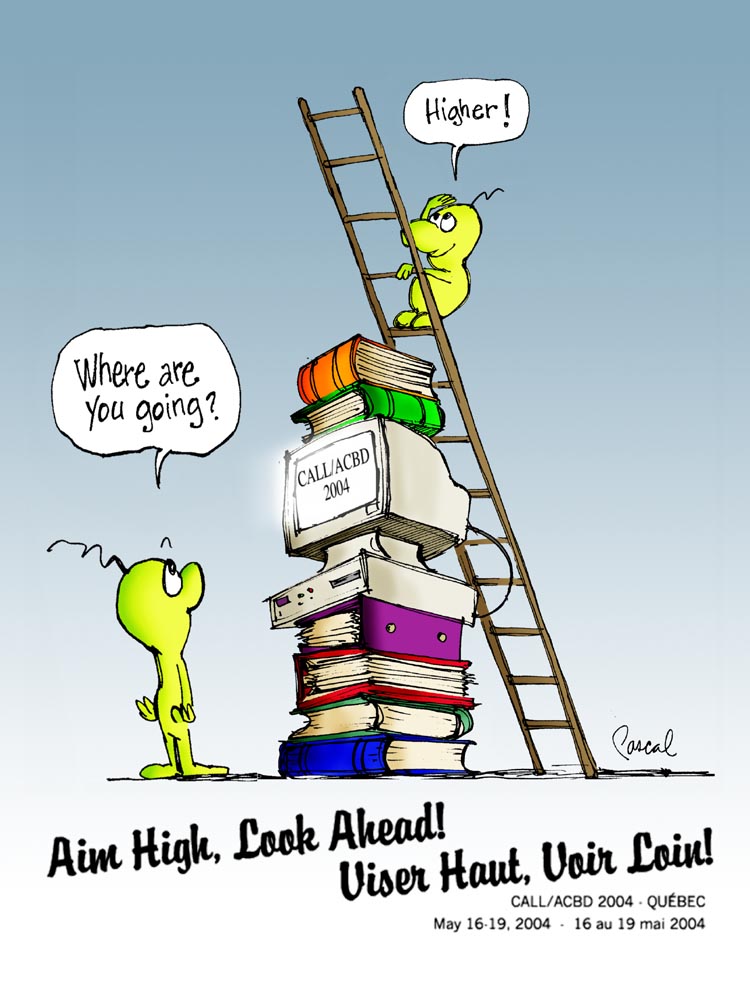 Thank you, Jim! I am delighted to join the crew here at Out of the Jungle. I have been reading along since your inception and adding my two cents every now and then in the comments, so I am flattered to have been invited on board this week.
Thank you, Jim! I am delighted to join the crew here at Out of the Jungle. I have been reading along since your inception and adding my two cents every now and then in the comments, so I am flattered to have been invited on board this week.As Jim has mentioned, my bailiwick is law firm libraries, as opposed to academic libraries. I will do my best to give a Canadian perspective but please remember I do have this particular bias.
Let me start by recounting a recent meeting that was, for me, a watershed moment in my understanding of the way law students and lawyers learn legal research. At the 2004 Canadian Association of Law Libraries conference, CALL/ACBD 2004 in Québec City, academic and private firm law librarians wedged themselves en masse into a small meeting room for a program put together by CALL's Academic Law Libraries Special Interest Group. This was the hottest ticket of the day in more ways than one...

For years Canadian law firm librarians had been alleging that the academic schools were not adequately teaching law students how to conduct legal research. Meanwhile, the academic law librarians were countering that indeed they had been making concerted efforts to ensure students graduated with solid research skills. This day was to be the big "showdown", and we were all gathering to see who would be left standing at the end of the discussion.
The session was held on Monday, May 17, 2004 and entitled Great Expectations: Are we delivering what they need?
The Panel Speakers:
John Eaton, University of Manitoba, Law Librarian & Associate Professor, University of Manitoba, Winnipeg, Manitoba
Laurel Murdoch, Librarian, Heenan Blaikie LLP, Toronto, Ontario
Robin Dewe, Vice President, Customer Service, LexisNexis Canada
Laurie Amiruddin, Manager for Customer Learning, Thomson Carswell
Martin Boodman, Partner, Director of Research, McCarthy Tétrault, Montréal, Québec
Gail Hogan, Law Librarian, Law Society of Newfoudland, St. John’s, Newfoundland
This was the session's description:
Law Firm and Law School Librarians are concerned that law students are not acquiring the database searching skills needed to be efficient (=cost effective) researchers. How can Law Librarians and Database Training Providers work together to make online research training exciting to law students. How can we to create a better articling researcher. Our panel will include a law school legal research instructor, a law firm and Great Library librarian, a law firm director of research, and representative voices from the legal online publishing world.
As an outcome, we would like to get some concrete ideas as to how better to prepare our students for life in the law firm. We would like, as Academic Law Libraries, to have a better understanding of how the law firms view our “product” once it reaches them. We would also like to share with the firms our own concerns about how our students view the importance of legal research skills. Why do they not feel the need to take Legal Research classes or attend special training sessions? All sides have a need to live up to Great Expectations.
John Eaton did a fine job representing the academic librarians. They are working hard to balance many different interests. They were working to improve methods of teaching research skills to students, and were seeking to find ways to make it them even better. Several representatives from law school libraries from across Canada stood up from the audience and discussed the particulars of their programs. Many of the schools offer advanced legal research courses in second and third year to supplement what is taught at the beginning. The problem seems to be that few law students are interested in attending these courses.
The problem, though, may run even deeper. Could a law school possibly recreate the type of research work (or other work, for that matter) that a student would be doing in the workplace? It is difficult to recreate the varied types of client matters as well as cost and time pressures that exist in a law firm. No matter how hard a law school tries, can they possibly prepare the student for research in these conditions?
The other speaker who stood out for me was Laurel Murdoch, representing the law firm librarians. She talked about the extensive orientation and research training sessions held by firms across the country. Law librarian associations were even finding it necessary to organize "boot camps" for those arriving at the law firms to meet the demand. Why was this necessary if law schools were adequately teaching the students? And even if work places vary, why could the schools not show students how to locate and update (Shepardize) case law, and locate and update legislation? These are basics common to all forms of legal research.
The real epiphany for me at this session was that, even though law students were being trained as they went along, they were not retaining what was being taught. Why was this? If they were not immediately using what they learned, they immediately lost that particular research skill. Could it be that generally law students (and, later on, lawyers) have a specific type of learning style, in that they only retain a research skill for long as it is necessary, and then that skill is "overwritten" in their brain as the next necessary type of skill comes in?
Perhaps the way we have been teaching students has been all wrong. How could they possibly remember what they learned in first year, three years later when that information is necessary in the law firm? Moreover, how could the two hours (or four hours, or four days, depending on the firm) that we spend with them when they arrive in law firms be expected to be adequate for giving them the basics of
research for the rest of their legal careers?
I came away from the session feeling that, while there was no clear-cut winner in the debate, we all had a better appreciation for the challenges faced by our colleagues in the other organizations. Perhaps, rather than pointing fingers, we needed to work more closely to find solutions to the problems faced.
While I haven't fully answered the questions raised for myself, I have been exploring them and will try to develop these ideas later in the week.
Cheers,
Connie
No comments:
Post a Comment